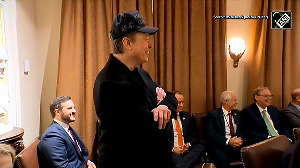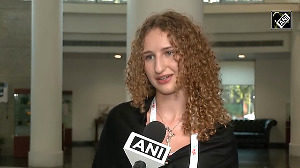On Tuesday morning, Pallavaram railway station in suburban Chennai was all hustle and bustle as usual. Nobody paid too much attention to a man sitting on a bench on platform number 2, reading a newspaper for more than an hour.
At about 11.30 am, a Tambaram-bound train was pulling into the platform. Before anyone could realise what was happening, the man jumped onto the tracks in front of the moving train with the agility of a sportsperson.
He died instantly.
The police found four letters in his pocket, one of which was addressed to his wife. 'I lost the dignity I had during my playing days. My financial state has forced me to take this extreme step. Please forgive me,' he had written.
He was V P Sathyan, once captain of the Indian football team.
When he took his life, he was one of the national selectors, and the coach of the Indian Bank team.
Sathyan's colleague Jayashankar Menon, a manager at the bank who had played basketball for India, identified the body.
Menon was numb as he drove to the station. He still cannot believe Sathyan, who he had known for 20 years, had committed suicide.
"He (Sathyan) was a man who could be looked upon as a role model by all budding sportsmen. He was the ideal sportsperson, dedicated and disciplined," says Menon.
Josey Mathew, sports officer, Customs, knew Sathyan for more than 16 years -- from the days they practised together as students at the Police Ground in Thiruvananthapuram, Kerala.
"Later when I worked for the Food Corporation of India, Sathyan was with the Kerala Police. Again, we were practising at the same place for a long time. We became very good friends. After we moved to Chennai also, our friendship continued without any breaks in all these 16 years," says Mathew.
He remembers Sathyan as a stickler for punctuality.
"If there was a practice session at 5 o clock, he would be there at 4.59. In all these years, I have never seen Sathyan coming late for any practice or any function," says Mathew.
"The only time I saw him coming late was the last time we met at a quiz a couple of weeks ago where we were judges. Sathyan was in Delhi selecting the Indian team. His plane from Delhi was late, and he was very apologetic. I still remember the way he walked in straight from the airport with a smile on his face and a bag on his shoulder," Mathew adds.
Mathew and Sathyan's teams, Customs and Indian Bank, often played against each other.
"On the field, we were bitter rivals but off the field, we were great friends. Last year, our team beat his team by one goal. They were the reigning champions, and were expected to win. In fact, newspapers had taken their photos before the match. But Sathyan was so sporting in defeat that he came and shook hands with me (and said), 'Your team played very well. We will see next year!'" reminisces Mathew.
Mathew knew Sathyan had financial problems. But he never asked his friend about them.
"We were very good friends. Still, I could not ask him what his problems were because Sathyan was a man who never let others, even his close friends, know about his problems," Mathew says.
"He was a man who preferred to draw a line between him and the others; he never let others cross that line. I knew there was something wrong with him and his life but I felt hesitant to talk to him about something so personal. The problem with Sathyan was that he chose to keep his problems to himself," Mathew continues.
"If he had opened up to his friends, we would not have let this happen. We would have helped him. In fact, last week also, some of us friends discussed that we should find out the truth and help him. What was the need for him to end his life?"
"He preferred to show a macho image of himself to others. Even in death, he looked majestic. I was there when his body was being embalmed. His biceps looked as if he was just out of the gym. It was really sad that a man who only showed his strong face to others was so weak," sighs Mathew.
The talk that Sathyan was a heavy drinker is unacceptable to Indian Bank sports officer D V Sundar, who worked closely with the former Indian captain.
"If that was so, I would have seen him drinking at least once; I know him for the last 12 years. He never came to the office or the field smelling of liquor. I would call him a role model for all sportspersons; a thorough gentleman," says Sundar.
Menon thinks what happened to Sathyan can happen to any celebrity who is out of the limelight.
"It can happen to filmstars also. It happened to (Diego) Maradona after he stopped playing," points out Menon.
"Sathyan's case is the best example of how a sportsperson, after his career is over, can fall into deep depression. You have to be mentally strong to lead a life of anonymity after being in the limelight. After a man's life as a sportsman is over, it is essential to channel his energy, expertise and talent in a proper way," adds Menon.
Mathew refutes this argument: "Sathyan was never out of sports; he was the national selector. Even after his playing days, he was in the limelight."
"As the national selector, he had to watch all the matches that are played in India. He was powerful, unlike many others who played with him -- they have become unknown entities doing small jobs in some small town. If the theory that a sportsperson suffers from depression once he stops playing is true, we would have seen suicides of sportspersons everyday," says Mathew.
Sundar agrees with Mathew. "One or two sportspersons may get into depression after they come out of the limelight, but not all. In the case of Sathyan, he was a national selector, and he was developing into a good coach. Unlike many other former players, everything was going well for him," Sundar says.
"I think he made a foolish decision by committing suicide. But I know one thing; he was very, very sensitive. I knew about his financial problems though he never told me so. He felt ashamed to share bad news. He didn't want anyone to sympathise with him. So, just a couple of days ago, I had told him not to worry because we were there to help him," says Sundar.
Menon wants the government and sports associations to take care of former sportspersons by utilising their talent in the best possible way.
"Unfortunately in India, only cricket and tennis are encouraged, and other sports heroes are forgotten. Can you believe Sathyan, even after achieving so much in football, after playing for India for so many years, was not given an Arjuna Award?" Menon says.
"It is not the time to talk about why Sathyan did this. Sathyan is no more. Let us talk about how such incidents can be prevented. It is high time we think of rehabilitating former sportspersons by engaging them in sports activities," says Menon.
"Let us see to it that there are no more Sathyans in India."







 © 2025
© 2025